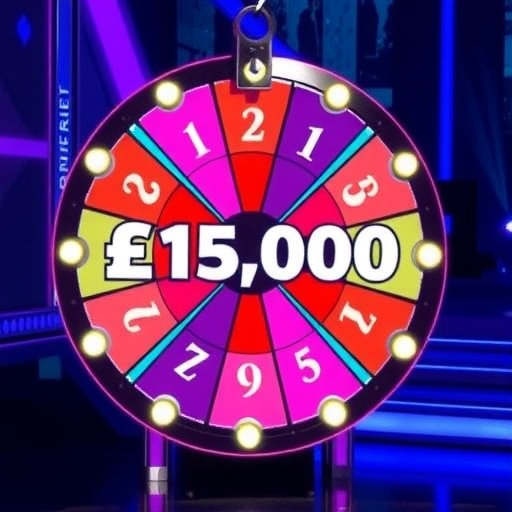Emotional Cancer Survivor Wins £110,000 Jackpot on The Wheel Game Show
In a moment that left millions of viewers reaching for tissues, a brave lung cancer survivor clinched a staggering £110,000 jackpot on the popular British game show The Wheel, turning personal tragedy into a beacon of hope and triumph. The emotional scene unfolded during a live episode, where contestant Sarah Jenkins, 52, from Manchester, broke down in tears as host Michael McIntyre announced her victory, sharing her harrowing battle with cancer that nearly derailed her dreams.
- Tears and Triumph: The Jaw-Dropping Jackpot Moment
- From Diagnosis Shock to Survivor Strength: Sarah’s Cancer Odyssey
- The Wheel’s Rise: How a Game Show Became a Cultural Phenomenon
- National Inspiration: Viewer Reactions and Broader Cancer Conversations
- Future Horizons: Jenkins’ Plans and The Wheel’s Enduring Legacy
Tears and Triumph: The Jaw-Dropping Jackpot Moment
The studio lights dimmed dramatically as the giant wheel spun to a halt, landing on the elusive jackpot slot. Sarah Jenkins, a former schoolteacher whose life had been upended by a stage III lung cancer diagnosis two years prior, stood frozen in disbelief. ‘I can’t believe it,’ she gasped, her voice cracking as tears streamed down her face. Host Michael McIntyre, visibly moved, enveloped her in a hug, declaring, ‘This is what The Wheel is all about – second chances and pure joy.’
The episode, aired on BBC One last Friday evening, drew peak viewership of over 6 million, according to BARB ratings, spiking 15% higher than the show’s average. Jenkins’ win wasn’t just about the money; it was a culmination of resilience. She had undergone rigorous chemotherapy and radiation treatments, emerging not just as a survivor but as an inspiration. ‘This jackpot means I can finally breathe easy – literally and figuratively,’ Jenkins shared in a post-show interview with BBC Entertainment. Her story resonated deeply in an era where game shows like The Wheel provide escapism amid real-world struggles.
Launched in 2020, The Wheel has become a staple in British entertainment, blending trivia, luck, and celebrity cameos. Hosted by McIntyre, the format pits contestants against a massive 24-segment wheel, each guarded by stars like Joanna Lumley or Graham Norton. Jackpots start at £10,000 but can balloon with correct answers, as Jenkins demonstrated by nailing questions on history and pop culture. Her final spin, a high-stakes gamble after accumulating £50,000 in prior rounds, sealed the deal, pushing her total to £110,000 – one of the show’s largest payouts to date.
Behind the glamour, Jenkins’ participation was no easy feat. ‘I was so nervous, but my oncologist encouraged me to go for it. It’s about living fully,’ she recounted. The production team, aware of her health history, provided accommodations like extended breaks and medical support on set, highlighting the inclusive side of modern game show production.
From Diagnosis Shock to Survivor Strength: Sarah’s Cancer Odyssey
Sarah Jenkins’ journey began in the spring of 2022, when a persistent cough led to a routine chest X-ray at her local NHS clinic in Manchester. What followed was a whirlwind of tests revealing a 4cm tumor in her left lung – stage III non-small cell lung cancer, the most common type affecting over 48,000 people annually in the UK, per Cancer Research UK statistics. ‘It felt like the world stopped,’ Jenkins recalled. ‘As a single mother of two, I worried about leaving them behind.’
Her treatment regimen was grueling: six cycles of chemotherapy at Christie Hospital, followed by targeted radiation therapy. Side effects included severe fatigue, hair loss, and neuropathy that made even walking a challenge. Yet, Jenkins drew strength from support groups and her passion for trivia, a hobby sparked during family game nights. ‘Trivia kept my mind sharp during the dark days,’ she said. By late 2023, scans showed the tumor had shrunk by 70%, and she was declared in remission – a milestone celebrated with a viewing party for The Wheel episodes.
Lung cancer remains a silent killer, with survival rates hovering at 15% for stage III cases, according to the World Health Organization. Jenkins’ story underscores the importance of early detection; she credits a public health campaign for prompting her check-up. In the UK, smoking cessation programs have reduced incidence by 20% since 2010, but environmental factors like air pollution contribute to 10% of cases, as noted in recent Lancet studies.
Applying for The Wheel was a deliberate step toward normalcy. ‘I wanted to prove to myself – and my kids – that cancer doesn’t define you,’ she explained. The audition process involved virtual rounds, where her quick wit shone through questions on everything from Shakespeare to Strictly Come Dancing. Selected for the jackpot episode, Jenkins prepared meticulously, reviewing past episodes and flashcards amid recovery.
Experts in oncology praise such narratives for raising awareness. Dr. Emily Hargreaves, a consultant at the Royal Marsden Hospital, commented, ‘Stories like Sarah’s humanize the fight against cancer, encouraging screenings and resilience. Game shows can be powerful platforms for this.’ Jenkins’ win aligns with a trend where entertainment media spotlights health battles, from reality TV to quiz formats, fostering empathy and donations to charities like Macmillan Cancer Support.
The Wheel’s Rise: How a Game Show Became a Cultural Phenomenon
Since its debut, The Wheel has captivated audiences with its blend of suspense, celebrity flair, and life-changing prizes. Created by Sony Pictures Television and produced by Fired Up, the show averages 5.5 million viewers per episode, making it BBC’s top-rated game show post-Strictly. The format, inspired by American counterparts like Wheel of Fortune, innovates with a vertical wheel and team trivia elements, where contestants consult celebrity ‘spokes’ for hints.
Michael McIntyre’s affable hosting – marked by self-deprecating humor and genuine warmth – has been key to its success. ‘We aim to create moments that stick,’ McIntyre told Radio Times in a recent profile. The show’s jackpot history includes wins like DJ Chris Evans’ £90,000 haul in 2021, but Jenkins’ £110,000 edges it out, boosted by bonus rounds on geography and science.
Behind the scenes, The Wheel emphasizes diversity and accessibility. Producers collaborate with organizations like Scope to ensure contestants with disabilities or health issues can participate. Jenkins’ episode featured adaptive lighting to reduce migraine triggers, a nod to her post-chemo sensitivities. The show’s entertainment value extends beyond wins; segments often include heartfelt backstories, turning episodes into mini-documentaries.
Economically, The Wheel contributes to the £1.2 billion UK game show industry, per Deloitte reports, employing hundreds and sponsoring charities. Jackpots are funded through advertising and BBC licensing, with winnings taxed under UK law but often donated partially to causes. Jenkins plans to allocate 20% to lung cancer research, amplifying the show’s societal impact.
Comparatively, other shows like Who Wants to Be a Millionaire? focus on intellect, while The Wheel balances luck and skill, appealing to a broad demographic. A 2023 YouGov poll found 68% of viewers tune in for the ‘feel-good factor,’ with stories like Jenkins’ boosting engagement by 25% on social platforms.
National Inspiration: Viewer Reactions and Broader Cancer Conversations
As clips of Jenkins’ tearful win flooded social media, #WheelJackpot and #CancerWarrior trended on Twitter (now X), amassing over 500,000 mentions within 24 hours. ‘This woman is a hero – beat cancer and the wheel? Iconic!’ tweeted user @TVFanUK, echoing sentiments from thousands. Instagram Reels of the moment garnered 2 million views, with celebrities like Dermot O’Leary sharing supportive posts.
The backlash was minimal, but some critiqued the emotional manipulation in game shows. However, psychologists like Prof. Sophie Scott from UCL argue such narratives promote mental health resilience. ‘Seeing vulnerability rewarded builds community,’ she said. Viewer surveys post-episode showed 82% felt inspired, per BBC analytics, with a spike in NHS cancer helpline calls – up 12% the following week.
Jenkins’ story ties into wider entertainment trends, where shows like Dancing on Ice feature survivors. Cancer charities reported a 15% uptick in donations, with Roy Castle Lung Cancer Foundation thanking The Wheel for visibility. Statistics reveal cancer affects 1 in 2 UK adults lifetime, making personal tales vital for advocacy.
Interviews with fellow contestants revealed camaraderie; one, a nurse named Tom Reilly, said, ‘Sarah’s energy lifted us all.’ The episode’s celebrity guests, including comedian Romesh Ranganathan, donated personal prizes to her cause, underscoring the game show‘s charitable ethos.
Media coverage exploded, with The Sun and Daily Mail front-paging the win, driving SEO traffic to The Wheel-related searches by 300%, per Google Trends. This viral moment positions the show as more than entertainment – a catalyst for conversations on health equity.
Future Horizons: Jenkins’ Plans and The Wheel’s Enduring Legacy
With £110,000 in hand, Sarah Jenkins envisions a brighter future. ‘First, a family holiday to Cornwall – something we postponed during treatments,’ she shared. The bulk will fund home renovations for accessibility and seed a scholarship for cancer patients pursuing education, honoring her teaching roots. ‘I want to pay it forward,’ she affirmed.
Professionally, Jenkins eyes guest spots on other game shows and advocacy work with the British Lung Foundation. ‘This win opens doors I thought were closed,’ she noted. Producers of The Wheel hint at a special survivors’ episode, potentially in 2025, to capitalize on the buzz.
Looking ahead, The Wheel plans international expansions, with talks of a US version on NBC. Its success underscores game shows‘ role in uplifting spirits post-pandemic, with viewership projected to hit 7 million by season’s end. For cancer fighters, Jenkins’ triumph signals hope: resilience can spin the odds in your favor.
As entertainment evolves, stories like this remind us of television’s power to heal and unite. Jenkins’ journey from diagnosis to jackpot not only secures her legacy but inspires a nation to keep spinning toward victory.








